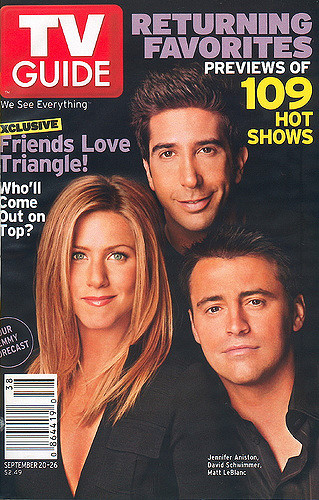I think about Jennifer Aniston every day. And while I am proud of my ability to work a Friends reference into almost any situation, I think about Aniston so often for a different reason. I am 27 and considering a tubal ligation surgery, or ‘tying my tubes’ and permanently closing the door on having biological children. I’ve been wrestling with this decision for nearly four years and each time it crosses my mind, I think of Aniston and her role as unofficial spokeswoman for childless women everywhere. For decades, tabloids have been hopefully speculating about Aniston’s womb and still run false pregnancy announcements well into her late forties and despite her repeated declarations to the contrary. I think of Aniston because she often serves as a stark reminder for women like myself, how the world chooses to treat single women without children. Spoiler: It is rarely celebrated, nor respected.

Still, despite the possibility of being unfairly seen as a selfish or as an irresponsible enigma for never bringing new life into the world, I am very seriously considering tubal ligation surgery. While it might be more possible than ever in the post #metoo era to go against the grain of Western society by not having children, it seems that society will demand I constantly explain and justify this choice indefinitely. So, let me explain why I’m considering such a permanent option.
I have struggled with a series of hormonal imbalances and autoimmune diseases for most of my adult life, and I am also a sufferer of chronic migraines. Normal birth control choices are not a true option for me. And after a terrible experience with an IUD three years ago, which left me over fifty pounds heavier, depressed, and at what a neurologist would later tell me was a significantly increased risk of an early stroke, I vowed to never again ‘test out’ a birth control simply because a seemingly kind (but quietly adhering to prescription quotas and overbilling my private insurance company) lady gynecologist told me it was the best option. Frankly, after investigating further just how little research and development health care companies devote to women’s reproductive health and improving birth control methods, it is easy to see why there is no clear option for preventing pregnancy that does not come with detrimental side effects. Netflix’s recent documentary The Bleeding Edge shows the ease with which these options can ruin lives when not properly tested or prescribed. And with this, it is easy to understand why millennial women are abandoning the pill in increasing numbers. I was briefly intrigued by a new app, which tracks your cycles and temperature to prevent pregnancy, but with irregular periods, for me, there is still too high a risk of becoming pregnant.
You could say I’m what has been described to me as chronically single, and if ever there was a silver lining to being a third wheel more often than in a duo, it would be the lack of urgency on my part to truly find a long-term birth control strategy. My sometimes long stretches of celibacy mean I can be completely sure my period is just late and not life-altering. Any sexual activity on my part is often long-planned or at least suspected; however, I often still choose to withstand the incredible dose of hormones and excessive price of the Plan-B pill after any casual interaction on the off chance the condoms I personally select for reliability, do indeed fail. I do this because the thought of becoming pregnant is quite simply more horrifying than a high dose of hormones.
I keep waiting for the day this maternal drive will kick in, or I will notice my biological clock ticking down, but it doesn’t seem to be on the horizon.
I could reiterate old critiques about how society prepares women for motherhood from infancy, with baby dolls as gifts and the repeated references to a ‘maternal’ instinct supposedly embedded in our lady genes. I keep waiting for the day this maternal drive will kick in, or I will notice my biological clock ticking down, but it doesn’t seem to be on the horizon. Rather, when I picture my future, I see myself with a beautiful, clean home untouched by crayons or that eerily non-specific goo which seems to coat children wherever they go. I see myself with a dog, or two, and never in any of the scenarios of where I would like to live, the degrees I want to earn, or the career I wish to have, do I picture myself with a child. It seems as though a permanent birth control that would remove the stress of thwarting of an unwanted pregnancy is then the best option.
Or is it? I know my parents have already included plans in their retirement for when, not if, I give them grandchildren. And while I know it will be a source of tension and disappointment with my parents if I never have children, I never expected it to be a source of tension with close friends. I am still surprised at the reaction of one of my life-long friends to be, not just confused by my dilemma, but actually angry at the thought I would sterilize myself. She had just fallen in love with a nice, handsome guy and told me I didn’t understand what it was like to want to have someone’s child, and maybe she was right. What if I meet my perfect match tomorrow and I fall so in love I want miniature versions of him to surround me forever? Would that urge supersede the horror I feel whenever I think of disrupting my body’s hormones I have spent years in agony trying to balance simply to tear open my body for another person? I doubt it. I know logically these external pressures are not reason enough to have a child, but is the stress of explaining my decision and facing the disappointment of my family, friends, and potential future mate less than the stress of my bleak birth control options now?

To be quite honest, I have often wondered why anyone would have children. Our current political climate suggests the stability I enjoyed, as a white, somewhat wealthy suburban child will be more difficult to produce for my own children. We are all facing a world with fewer resources, higher prices for housing and food, and stagnant wages globally. Not to mention, I am from the U.S. where we still do not have a national health service and lack of access to health care is likely to blame for our incredibly high infant mortality rate. I already know my own medical history would put me at a higher risk of a difficult pregnancy, but this is seemingly inconsequential next to the risk for black women and their babies in the U.S. who are 3 to 4 times more likely to die during childbirth. Not only does it cost nearly an average year’s salary ($32,093) to give birth in the U.S. but women are then facing increased pressure to return to work with lack of maternity support and the incredibly high cost of child care, despite incredibly low wages for child care providers. It is seemingly more difficult to comprehend that while hundreds of thousands of children are taken into the foster care system every year in the U.K., adoption rates for these children into permanent homes is falling. So if society pressures women to become warm mothers who balance a career and bake, why is it still so difficult. It seems women face an uphill battle regardless of their choice, so where does this leave us?
I am still very single and I have time to decide if tubal ligation is the right option for myself. While I am leaning toward having it done, I still have many concerns. One thing, however, is abundantly clear: we need a system that does not punish women simply for being women. The truth is, I will face lifelong scrutiny if I choose not to have children, and the harder truth we all must face is that this same system makes the ‘acceptable’ choice for some even more difficult, and that, like many of our current birth control options, is truly dangerous.
Cover photo: Simone van der Koelen; Licence:Unsplash










